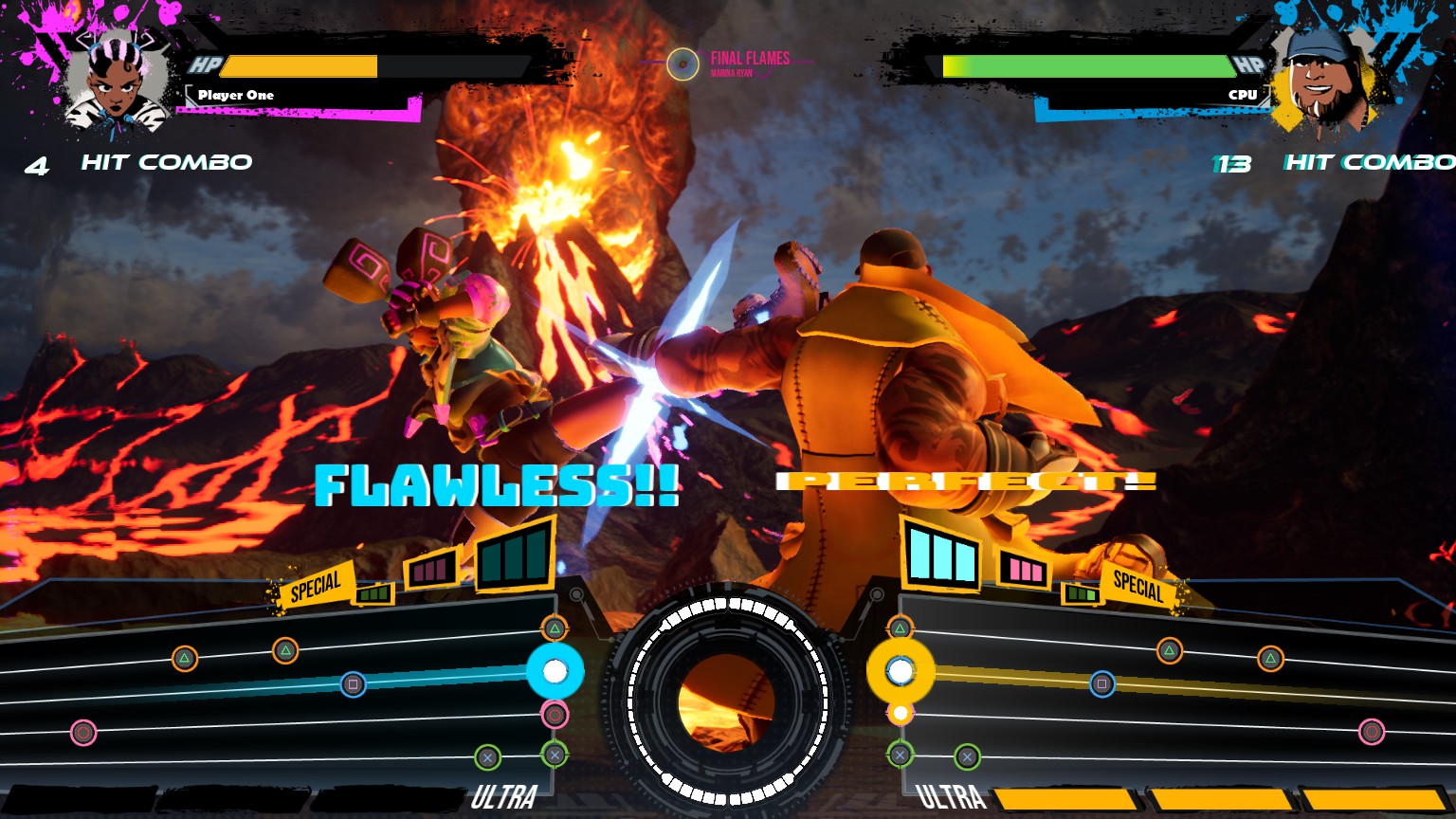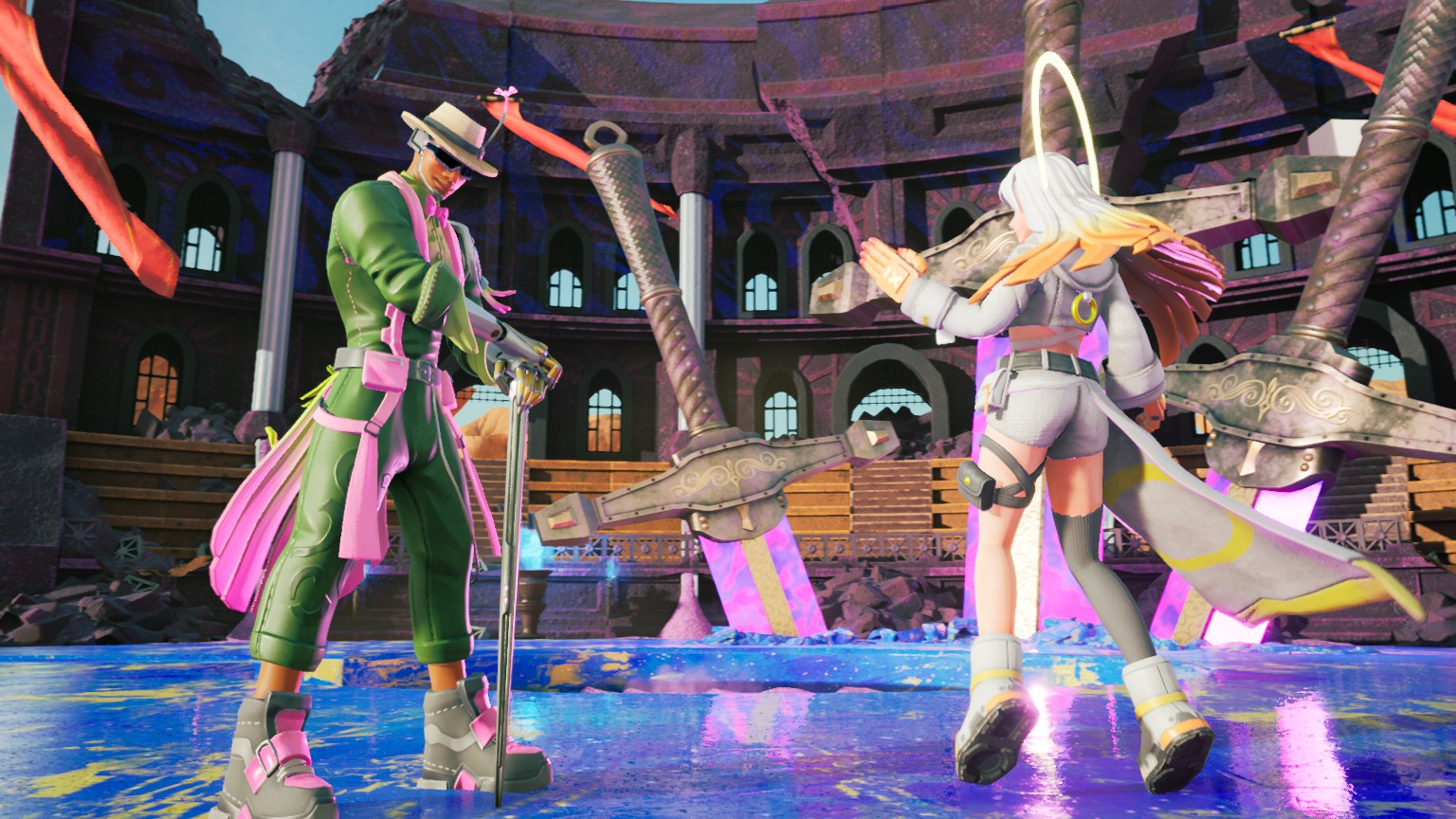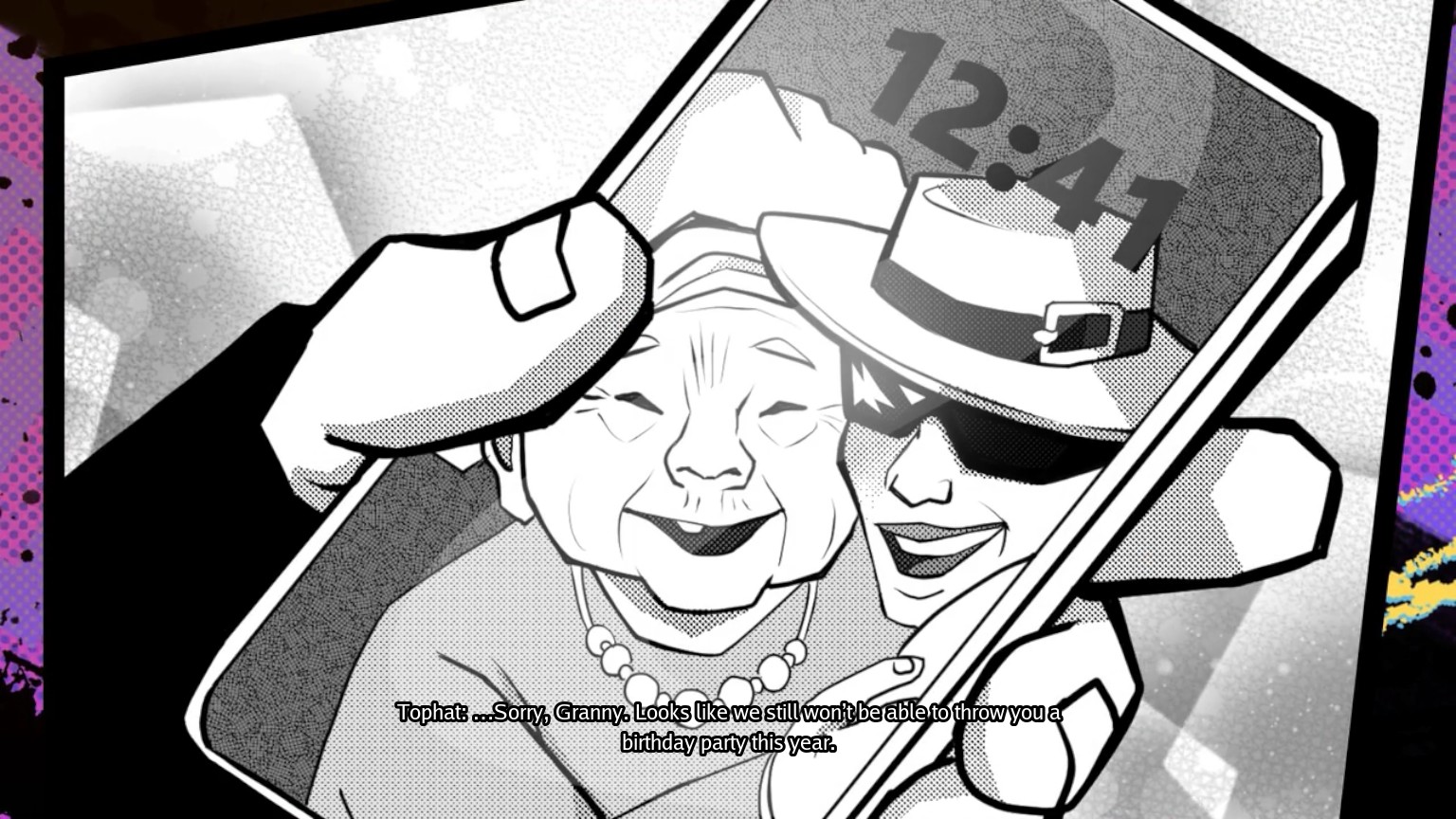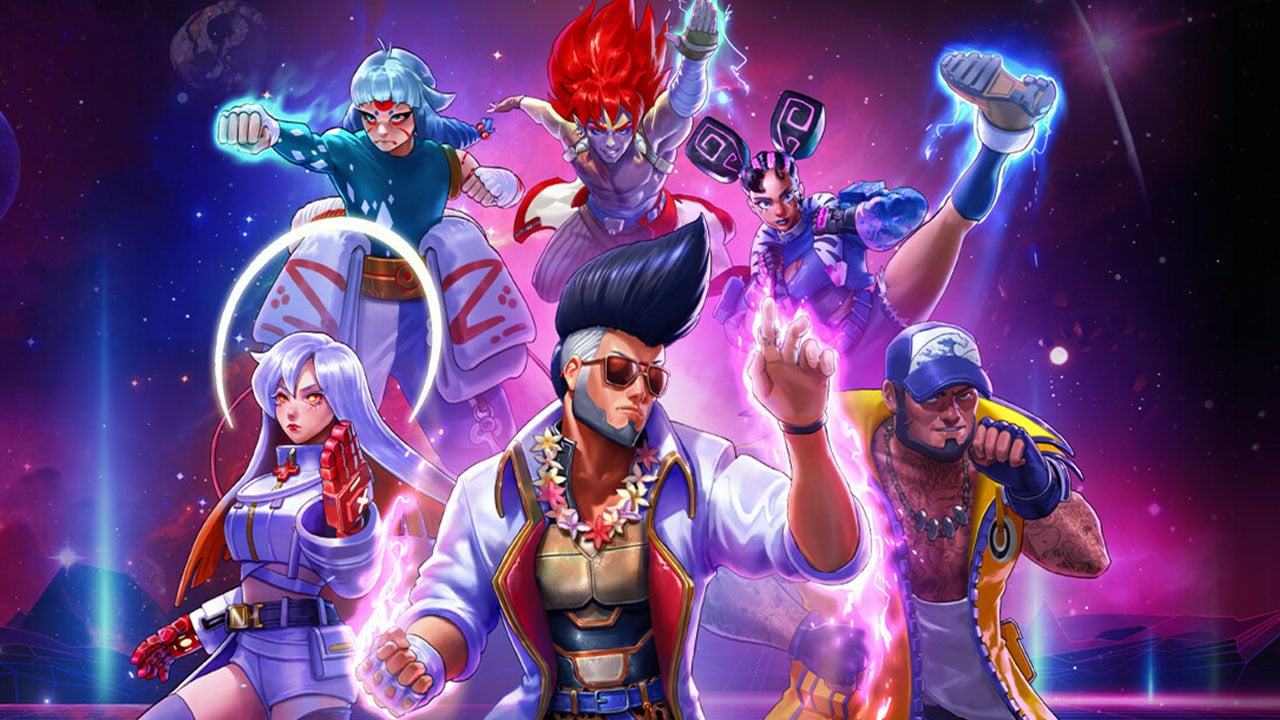Have you ever wanted to play Tekken in a rhythm game format, punctuated with sick guitar riffs and crazy beats? Despite sounding like a 60’s granddad’s worst nightmare, that’s exactly what God of Rock is.
A fighting game where you do little of the actual fighting, you’re instead required to “rock out” via button inputs instead of launching minute-long combo chains and practicing your aerial juggles. Provided the music is on point, the input gameplay is tight and the style is suitable notched up to drug-induced obscenity, it could probably work remarkably well.
Unfortunately, God of Rock falls apart in almost every one of those categories. Relegating it from a certified rock classic like Led Zeppelin to a poor, teenage-cringe band practicing in their garage. With lamps for guitars. Or something.
This Is Just A Tribute
God of Rock sadly won’t be getting any accolades for being the best rhythm game in the world, oh no. The core mechanic works simply enough – there are 4 lines where notes will appear. Once the note hits the end of the line and matches up, you hit the corresponding button. The more precisely you hit the note, the higher the rating.
As you furiously mash away to the beat of the song, you’ll see your character battling away with their opponent. Both competitors hit the same notes, the one with the higher rating inflicting damage on the other. Should you both hit an equally precise note, the damage is blocked or negated. So, gone are the twitch reactions and long combo memorising you’d do in a fighting game, now you just hit as many notes in sequence while your chosen fighter does whatever in the background.
While it creates a flashy feel to the game, owing to the intense visual flair and animations that’ll be on display, it’s not especially satisfying. Each given song will continue infinitely until one combatant falls, with the speed increasing significantly as the duration continues. It’s like reaching the crescendo of an awesome guitar sequence but it drones on so long you get bored.
It’s also quite unbalanced, as some of the button input sequences become ridiculous tests of contorting fingers to reach various combos. After one arcade run of about 10 battles, I was already starting feel mentally fatigued. Given I’ve put over a dozen hours into Theatrhythm in the past few weeks alone, that isn’t a great sign. I like rhythm based games a lot, but God of Rock feels unfairly weighted against human players or average people the longer a song continues.
Like The Police, you’ll be sending out an S.O.S.

Iron Faden
Correctly timing button inputs isn’t the only gameplay system you’ll need to balance during your jamming sessions. To add an element of fighting game spice into the mix, God of Rock has a handful of special moves and a unique Ultra ability for each fighter. At any point during a song (provided the relevant bar is filled), you can unleash these abilities to inflict extra damage on your opponent.
Activating these moves requires you to use the left or right thumbsticks (don’t even bother asking me about the keyboard inputs) in specific sequences, you know like how left, right X in Mortal Kombat 11 does Sub-Zero’s slide move. Songs rarely have down time within them so you’ll need to either git good or sacrifice your note combo to use them, as I challenge anyone to do both simultaneously when the notes are hectic.
It feels incredibly clunky and ill-fitting, even if it makes sense thematically as a fighting styled game. The fact the detection inputs would never register left flicks first also meant at least one special per fighter was locked out for me too. If you hesitate or miss for a split-second, you’ll drop the sequence and have to do it from fresh. Basically, you lose your combo AND embarrass yourself by not firing your special. Might as well be missing your bar chords and stacking it off the stage while you’re at it.
At lower difficulties you can get around this against the CPU as just hitting basic note combos will easily win you a match. However, against harder CPU difficulties where they hit almost all notes perfectly, or against try-hard online players, there’s simply no other solution other than to spend hours re-calibrating your hands to become dexterity gymnasts.
It leaves a sour taste on the gameplay, as the specials themselves are flashy and interesting, plus your opponent can counter them by matching extra inputs to negate their damage. There’s a great beat underlying the shoddy melody, somewhere.

King Of Flop
God of Rock’s roster of larger-than-life characters are a relative highlight in an otherwise underwhelming concert. From the Elvis inspired King to the humbly named Champ, they’re an eclectic bunch with unique personalities. Their dialogue pre-fights is rather dreadful, particularly with Elvis’ insistence on saying “baybeh” every goddamn line, but it’s slightly humerous terrible.
You don’t learn much about each personality, but if you engage with each of their arcade campaigns you’ll receive 2 cutscenes that bookend the gauntlet of matches. While nicely animated, the actual material and voice-acting in the scenes is comically awful, so you won’t be gleaning much about these “stars” and their histories.
God of Rock does do an admirable job bringing each fighter to life in caricatured fashion and honestly, one of the best parts of this otherwise mediocre package is the character design itself. As touched on before, they all have unique moves, animations and special input sequences akin to a fighting game, but it’s once again more style over substance.
Welcome to the jungle, we’ve got… hair and… awful dialogue?

In The End, Does It Even Matter?
God of Rock sports 3 main modes – arcade, online and local. Arcade provides a run of battles for each fighter with the aforementioned cutscene exposition. Online has both ranked and quick play, while local allows you to take on a friend in a 1v1 match-up for the ages. Whether you’ll find anyone online to riff against or if you’re willing to lose a friendship making them play local is your gambit to take.
The lack of any fully-fledged campaign or significant modifiers to game modes is disappointing and means God of Rock will likely sink to the bottom of the rock charts faster than an aged rockstar making a comeback, but there’s enough here for a couple of hours of decent fun. There’s a wealth of difficulty options to tune the CPU’s challenge too.
One flagship element of the game is the level editor. In this mode, you can select any song from the roster and map your very own button input extravaganza. You can mess around with the BPM, create ludicrous combo strings that even Slash would shed a tear for and fool around to your heart’s content.
It’s a very cool addition and one that will probably add a great deal of value to the game for those more musically attuned than myself. The roster of music available is pretty large and on the whole, the selection is very good. You won’t be getting any of the rock classics here, but the score has some pretty solid tunes to head-nod along too.
Master of Puppets this isn’t, but it’s certainly trying.

Stairway To Purgatory
Truth be told, I think a couple of issues I’ve mentioned with God of Rock can be ironed out, particularly with content updates and a thriving community of like-minded moshers. With enough practice and time investment, I’m sure the inherent rhythm gameplay would potentially become more satisfying too, but the missing level of variety and simplicity of the loop mean I, and I suspect many others, won’t be very motivated to find out.
I will say that the graphics are quite good, with some eye-popping locations such as an actively erupting volcano and the northern lights glistening as you throw fists. Animations and style are abundant in God of Rock, it’s just such a shame there’s so little substance to match its level.
I really wanted to like God of Rock – I love rock music, I love rhythm games, I love fighters. Despite loving each individual component however, I didn’t especially enjoy the end result. It’s like taking your three favourite bands and plastering their best songs over each other – you adore each unique element, but damn is it a clusterf*** of guitar strings, high-pitched screeches and drum bashing.
God of Rock has flashy, entertaining visuals with a thematic flair. While its style and level editor excel, the rhythm gameplay and fighting mechanics feel shoe-horned together, creating a clunky and messy whole. The music is great and the idea could work, but this isn’t the rock-charged moshpit that it promised to be.

God of Rock will be releasing on April 18th on PC (review platform), PlayStation 4/5, Xbox One and Xbox Series S|X.
Developer: Modus Games
Publisher: Modus Games
Disclaimer: In order to complete this review, we were provided with a promotional copy of the game. For our full review policy, please go here.
If you enjoyed this article or any more of our content, please consider our Patreon.
Make sure to follow Finger Guns on our social channels –Twitter, Facebook, Twitch, Spotify or Apple Podcasts – to keep up to date on our news, reviews and features.
